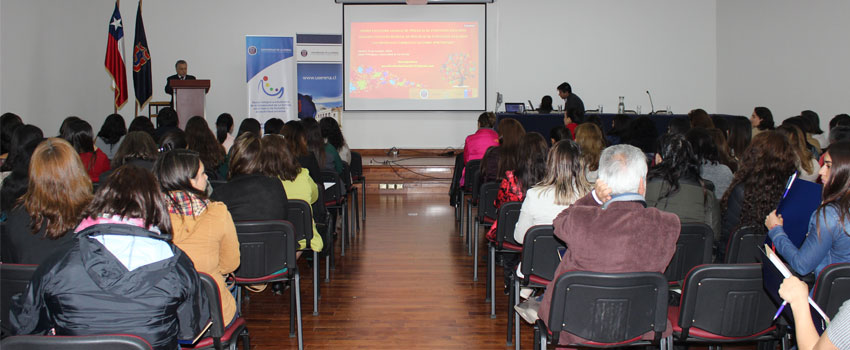
The activity was organized by the project “Comprehensive Support for ULS Students, within the framework of inclusion and universal accessibility (ULS1799)”.
With a Pentagon Room at full capacity, the First National Meeting on Inclusive Teaching Practices and the second version of the regional meeting on this topic “Differences enrich our learning” were held at the University of La Serena, with the aim of promoting the exchange of inclusive educational practices and experiences in kindergartens, schools and high schools in the Coquimbo Region and other parts of the country. The activity was organized by the project “Comprehensive Support for ULS Students, within the framework of inclusion and universal accessibility (ULS1799)”.
At the conference, which was attended by university authorities, professors and special guests, it was noted that the way of addressing the issue of inclusion is diverse, and that although not all educational institutions have specific practices, they do make the effort to have an open door policy, recognizing that there are endless aspects that must be taken into account, from the form of accessibility to the training of staff to work with people with different abilities.
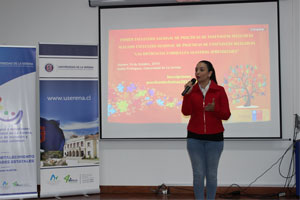 At the meeting, the SENADIS lawyer, Carolina Hernández, spoke, referring to the legal provisions that institutions face and what the process is that they must have when having to declare that they are an inclusive organization.
At the meeting, the SENADIS lawyer, Carolina Hernández, spoke, referring to the legal provisions that institutions face and what the process is that they must have when having to declare that they are an inclusive organization.
Today, educational institutions have been included in an agreement, through a declaration as a country, in the United Nations space, to move towards the elimination of poverty and social exclusion, stating that development not only has to do with the accumulation of wealth, but with access to education, participation and democracy.
Teachers from different schools in the Coquimbo Region, nursery educators from the ULS Kindergarten and representatives from establishments in Talca and Alto Hospicio also presented.
The academic and person in charge of the project “Comprehensive Support for Students of the University of La Serena, within the framework of inclusion and universal accessibility”, Dr. Georgina García, emphasized the need to maintain an integrative policy, respecting diversity and different aspects of this, ensuring that if a school ensures the development of the full potential of its students, it favors inclusion, social justice and democracy, in addition to the development of the entire community.
While the Academic Vice-Rector, Dr. Jorge Catalán, valued the holding of this event and indicated that “it is not only important for academics and pedagogy students to know about these experiences, but also for practicing teachers who are also part of our educational community, can learn from their colleagues in a clear example that inclusive education is possible when people come together committed to quality education and fundamental human rights.”
It should be noted that in 2007 the University of La Serena created the Disability Support Program, an instance that originated in the Department of Extracurricular Activities of the DGAE and whose fundamental purpose was to promote inclusive higher education processes for students with disabilities. in order to equalize educational opportunities that would allow us to respond to the academic, social and emotional demands that the professional training process implies.
In this context, since 2017, what is called the project “Comprehensive Support for Students of the University of La Serena, within the framework of inclusion and universal accessibility” began to be launched, which seeks to provide support in infrastructure and in aspects keys in support of the inclusion framework.
The program is currently financed by the MINEDUC State Universities Strengthening Fund and seeks to interact in different areas, whether academic, health, or social. In this last aspect, awareness campaigns have been carried out internally and locally, motivational talks for schoolchildren with disabilities, seminars, conferences, networks and dissemination activities at a regional, national and international level.
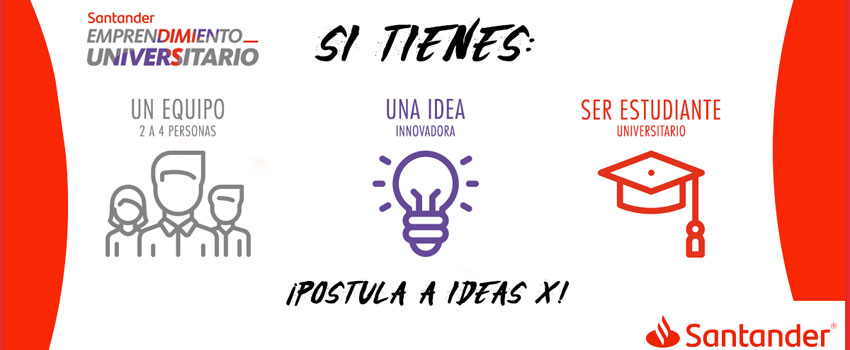

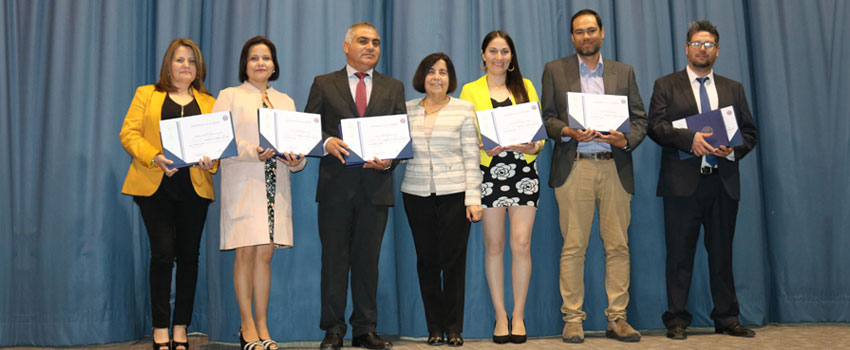
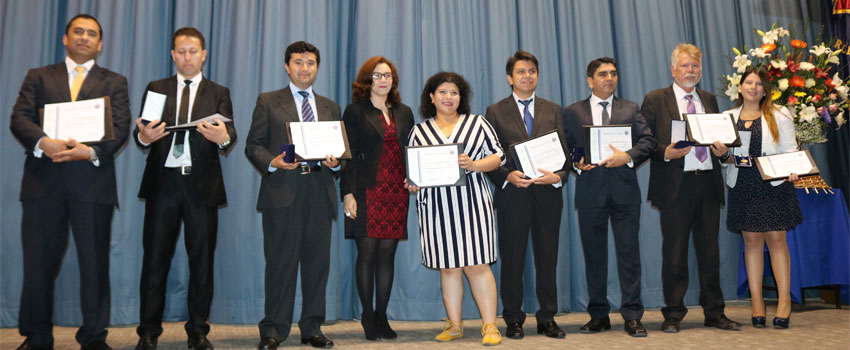
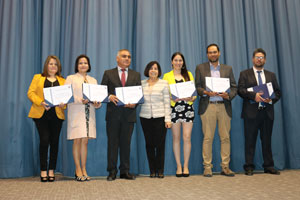 This year's graduates belong to the Master's in Astronomy programs; Master in Biological Sciences Ecological Mention of Arid Zones; Master in Physical Sciences; Master in Risk Prevention of Occupational Accidents and Occupational Diseases; Master in Leadership, Strategic Management and Communication in Organizations; Master in Leadership, Management and Strategic Communication; Master in Latin American Studies with a mention in Literature, Master in Psychology with a mention in Social Psychology; Master of Science in Food Engineering; Master in Computational Mechanics; Diploma in Environmental Management and Energy Sustainability; Diploma in Tax Management; Diploma in Leadership, Strategic Management and Communication in Organizations; Diploma in Human Rights Education; Diploma in Educational Leadership for School Improvement; Diploma in Cultural Heritage and Identity of the Limarí Valley; Interdisciplinary Diploma in Educational Innovation; Diploma in Computer-Aided Engineering Design and Calculation of Mechanical Structures and Diploma in Technical-Economic Management of Rock Blasting.
This year's graduates belong to the Master's in Astronomy programs; Master in Biological Sciences Ecological Mention of Arid Zones; Master in Physical Sciences; Master in Risk Prevention of Occupational Accidents and Occupational Diseases; Master in Leadership, Strategic Management and Communication in Organizations; Master in Leadership, Management and Strategic Communication; Master in Latin American Studies with a mention in Literature, Master in Psychology with a mention in Social Psychology; Master of Science in Food Engineering; Master in Computational Mechanics; Diploma in Environmental Management and Energy Sustainability; Diploma in Tax Management; Diploma in Leadership, Strategic Management and Communication in Organizations; Diploma in Human Rights Education; Diploma in Educational Leadership for School Improvement; Diploma in Cultural Heritage and Identity of the Limarí Valley; Interdisciplinary Diploma in Educational Innovation; Diploma in Computer-Aided Engineering Design and Calculation of Mechanical Structures and Diploma in Technical-Economic Management of Rock Blasting.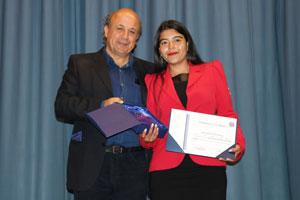 In his speech, the Vice Chancellor of Research and Postgraduate Studies of the state institution, Dr. Eduardo Notte, congratulated all the professionals who graduated from the different programs “and who together with their families, wives and husbands were able to materialize their improvement and turn these into an opportunity to acquire and generate knowledge around various topics, which will undoubtedly be very relevant for the region, the country and of course for their own professions.”
In his speech, the Vice Chancellor of Research and Postgraduate Studies of the state institution, Dr. Eduardo Notte, congratulated all the professionals who graduated from the different programs “and who together with their families, wives and husbands were able to materialize their improvement and turn these into an opportunity to acquire and generate knowledge around various topics, which will undoubtedly be very relevant for the region, the country and of course for their own professions.”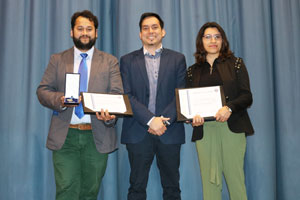 The ceremony included a talk called “Automation and the Future of Work”, given by the Director of Postgraduate and Postgraduate Studies at the University of La Serena, Dr. Cristian Ibáñez, who specified that it is a topic “transversal to all professions.” and where today you (the graduates of the programs) are taking a very important step to face this tremendous challenge that is automation, given that it is seen that in the not too distant future two types of workers will be generated in our society, the one formed by people who have a level of specialization and another with those who do not have it. It is expected that people who have a level of specialization will be able to access the best jobs in the future.”
The ceremony included a talk called “Automation and the Future of Work”, given by the Director of Postgraduate and Postgraduate Studies at the University of La Serena, Dr. Cristian Ibáñez, who specified that it is a topic “transversal to all professions.” and where today you (the graduates of the programs) are taking a very important step to face this tremendous challenge that is automation, given that it is seen that in the not too distant future two types of workers will be generated in our society, the one formed by people who have a level of specialization and another with those who do not have it. It is expected that people who have a level of specialization will be able to access the best jobs in the future.”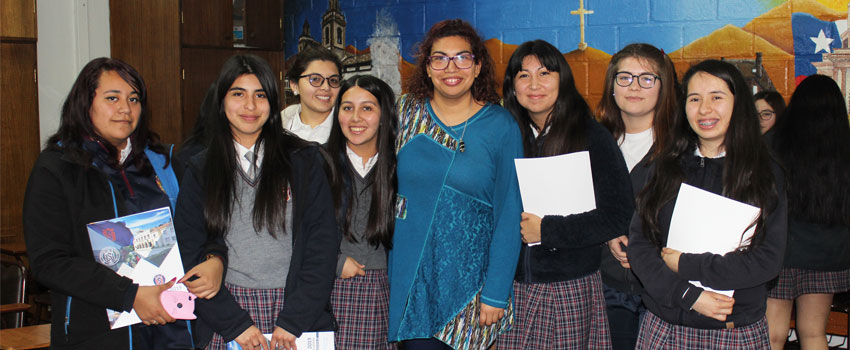
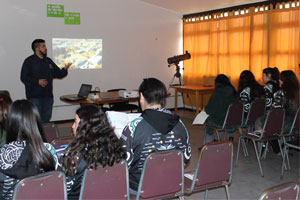 The visits were carried out through the coordination of the Promotion area and allowed material to be delivered to the establishments with complete information on the careers, scholarships and benefits that the school provides to regular students.
The visits were carried out through the coordination of the Promotion area and allowed material to be delivered to the establishments with complete information on the careers, scholarships and benefits that the school provides to regular students.
 At the meeting, the SENADIS lawyer, Carolina Hernández, spoke, referring to the legal provisions that institutions face and what the process is that they must have when having to declare that they are an inclusive organization.
At the meeting, the SENADIS lawyer, Carolina Hernández, spoke, referring to the legal provisions that institutions face and what the process is that they must have when having to declare that they are an inclusive organization.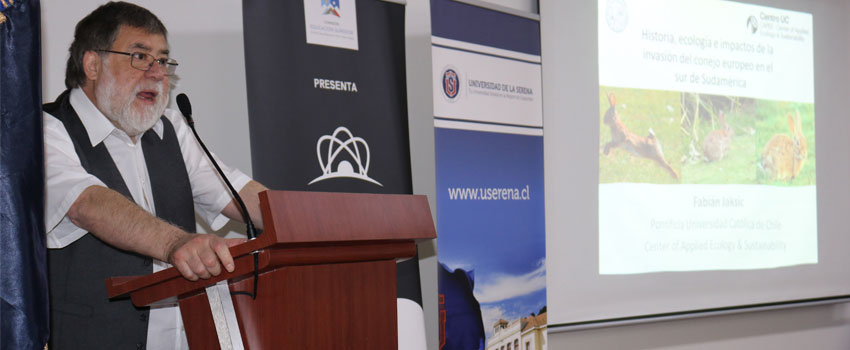
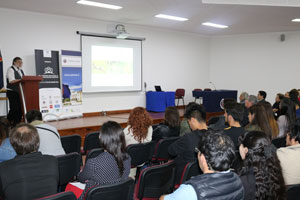 The presentation by the biologist specialized in the field of community ecology research was titled: “History, ecology and impacts of the invasion of the European rabbit in southern South America” and was part of the activities of the Second Binational Congress of Scientific Research Chile - Argentina that takes place from November 6 to 9 in La Serena as part of the Integration Committee of Paso Agua Negra and the Commission of Higher Education Institutions.
The presentation by the biologist specialized in the field of community ecology research was titled: “History, ecology and impacts of the invasion of the European rabbit in southern South America” and was part of the activities of the Second Binational Congress of Scientific Research Chile - Argentina that takes place from November 6 to 9 in La Serena as part of the Integration Committee of Paso Agua Negra and the Commission of Higher Education Institutions.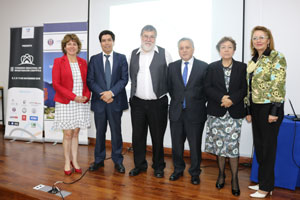 After the presentation by Dr. Fabián Jaksic, presentations began on the thematic lines of “Energy, Present and Future” and “Geoscience, Environment and Sustainability”, by representatives of the universities of La Serena, Católica del North and National of San Juan and the Center for Advanced Studies in Arid Zones, CEAZA.
After the presentation by Dr. Fabián Jaksic, presentations began on the thematic lines of “Energy, Present and Future” and “Geoscience, Environment and Sustainability”, by representatives of the universities of La Serena, Católica del North and National of San Juan and the Center for Advanced Studies in Arid Zones, CEAZA.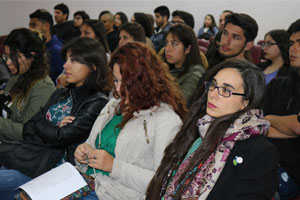 For her part, the president of the Commission for the Integration of Higher Education Institutions of the Coquimbo Region, Adriana Ledezma, expressed that “the first objective of this Congress is to deepen the collaborative work between the Higher Education institutions of both countries, with the I wish that joint research that favors Chile and Argentina can originate. As for the second objective, it is the possibility of promoting dialogue between researchers from the Coquimbo Region with the Province of San Juan, and without a doubt we have already been experiencing this since the first days of the Congress. In this way we are preparing to face and repair common problems that require solving with a joint scientific-technological response. This is how this academic event becomes a substantial link in the Chilean-Argentine integration process.”
For her part, the president of the Commission for the Integration of Higher Education Institutions of the Coquimbo Region, Adriana Ledezma, expressed that “the first objective of this Congress is to deepen the collaborative work between the Higher Education institutions of both countries, with the I wish that joint research that favors Chile and Argentina can originate. As for the second objective, it is the possibility of promoting dialogue between researchers from the Coquimbo Region with the Province of San Juan, and without a doubt we have already been experiencing this since the first days of the Congress. In this way we are preparing to face and repair common problems that require solving with a joint scientific-technological response. This is how this academic event becomes a substantial link in the Chilean-Argentine integration process.”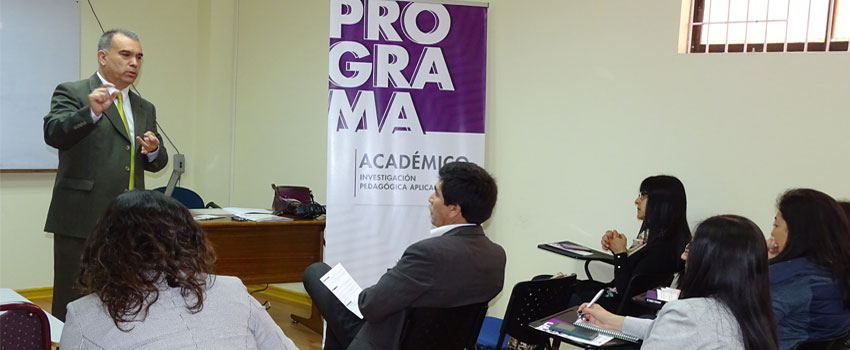
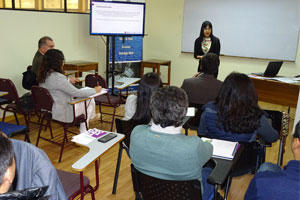 In this context, through the Integrated Management of Pedagogies Unit (UGIP), various workshops have been developed that have addressed the main aspects of Applied Pedagogical Research, in accordance with the main goals of the project. One of the recent actions aims to create a Nucleus that promotes new research in the area of education, mainly in the lines of pedagogy, innovation and didactics.
In this context, through the Integrated Management of Pedagogies Unit (UGIP), various workshops have been developed that have addressed the main aspects of Applied Pedagogical Research, in accordance with the main goals of the project. One of the recent actions aims to create a Nucleus that promotes new research in the area of education, mainly in the lines of pedagogy, innovation and didactics.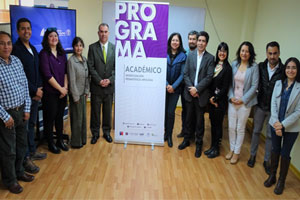 To date, the team has defined possible lines of research focused on Didactics and learning, Educational innovation, Professional development, and Curriculum development and learning evaluation, topics that are addressed in coherence with the CNA and institutional reality.
To date, the team has defined possible lines of research focused on Didactics and learning, Educational innovation, Professional development, and Curriculum development and learning evaluation, topics that are addressed in coherence with the CNA and institutional reality. 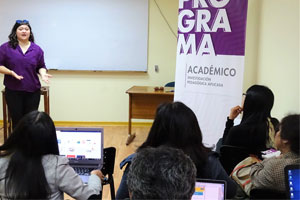 “The researcher's profile is a personal account in a certain web environment or database, which allows managing a scientific signature and thus facilitates research activity. There are different platforms where you can create researcher profiles. One of them is ORCID, which is mandatory, since all publication magazines are requiring it and even as part of the curriculum,” explained the professional.
“The researcher's profile is a personal account in a certain web environment or database, which allows managing a scientific signature and thus facilitates research activity. There are different platforms where you can create researcher profiles. One of them is ORCID, which is mandatory, since all publication magazines are requiring it and even as part of the curriculum,” explained the professional.